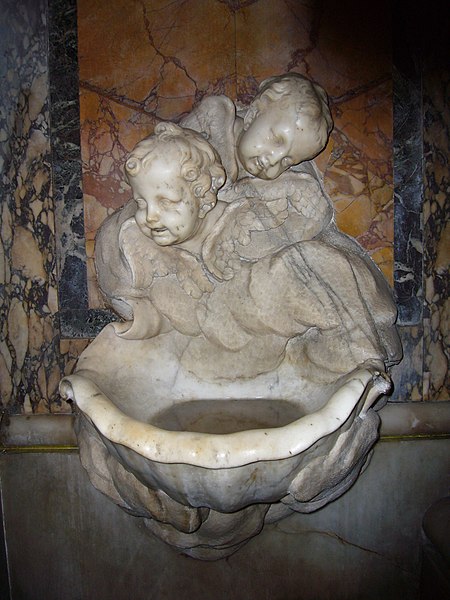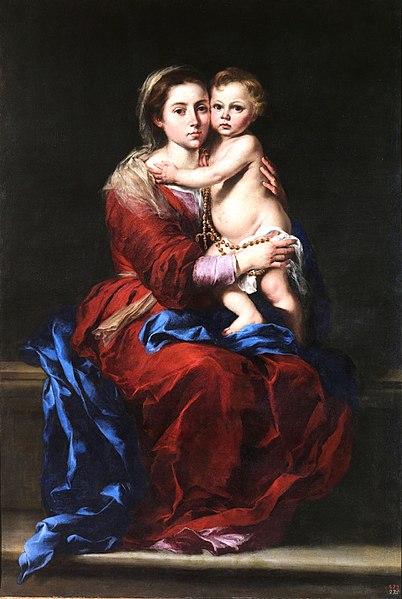To Search is To Find
Is blessing objects exclusive to priests?

I wanted to know more about holy water because tomorrow is Easter Sunday and I want to teach my little children why we're getting holy water from the church for our home.
Father Seán, if I have strong faith in God and believe in the power of holy water, and I have newly-bought candles and rosaries at home that are not blessed, can I bless them with the holy water myself? Or is it only priests who have the power to bless candles and other religious objects?
In line with the article here, cyber blessing is the newest way of blessing others just like what you're doing here, Father Seán! I do so too on my own blog! Isn't it just great, Fatherr! To be able to bless strangers on the net, with words and teachings of the Lord and of His church!
May the Father bless you, your family and your sheep a thousand-fold, Father Seán!
The blessings you ask about are mostly under the heading of sacramentals. The Catechism of the Catholic Church No 1671 says: Among sacramentals blessings (of persons, meals, objects, and places) come first. Every blessing praises God and prays for his gifts. In Christ, Christians are blessed by God the Father ‘with every spiritual blessing’. This is why the Church imparts blessings by invoking the name of Jesus, usually while making the holy sign of the cross of Christ.
Note that it says 'every blessing praises God'. Normally it is the priest who blesses persons and objects. It is common here in the Philippines in some places for people to approach the priest after Mass, especially on Sunday, to bless various objects or to bless persons. The day after he was elected Pope Francis happened to meet a young married couple in the Basilica of St Mary Major in Rome and, at the request of the husband, blessed his pregnant wife and their unborn child.
 Holy water font, Rome, Italy |
Infant baptism in a Catholic Church You asked specifically about bringing home holy water at Easter. During the Easter Vigil, held after nightfall on Holy Saturday, there is a Baptismal Liturgy when water is blessed. There is one form for blessing the water if baptisms are to take place, another form if not. Both are focused on the water used in baptism. Here is part of the prayer of blessing if there is not baptism, with some words highlighted:
Dear brothers and sisters,
let us humbly beseech the Lord our God
to bless this water he has created,
which will be sprinkled upon us as a memorial of our Baptism.
May he graciously renew us,
that we may remain faithful to the Spirit
whom we have received . . .
Therefore, may this water be for us
a memorial of the Baptism we have received,
and grant that we may share
in the goodness of our brothers and sisters,
who at Easter have received their Baptism.
Through Christ our Lord.
After this prayer the priest leads the people in the renewal of their baptismal promises and then sprinkles them with the newly-bless water. The water that people bring home is essentially to remind them of their baptism.
 French home holy water stoup or font French home holy water stoup or font |

Madonna with Rosary, Murillo, 1650 |
Churches have holy water fonts at their doors and we usually dip the fingers of our right hand into this and then make the Sign of the Cross as we enter.
When your editor was growing up in Ireland most homes, including his, had a small holy water font, not quite as elaborate or large as that in the photo above, at the door of the house and sometimes in bedrooms. When we would leave or enter the house we would bless ourselves with the holy water. We would bring home holy water from a barrel outside the church, the water having been blessed at Easter.
+++
I would suggest that since you have access to your church on a regular basis, you bring the objects you mentioned, rosaries, etc, to the priest and have him bless them.
+++
There are situations where a layperson is authorized to do a blessing, for example, leading a funeral service when no priest is available. This is quite common in p
arishes in the Philippines that are basically rural. When I was parish priest in St Niño Parish, Lianga, Surigao del Sur, nearly 20 years ago, a layman was delegated to lead funeral services if I was away. This would usually be the funeral of a person being buried on the day of death..
It is fitting for parents to bless their children, especially at night. And we can use the word 'blessing' in a broader sense of being a 'blessing' to others through blogs, etc. God can bless individuals in the most extraordinary and unexpected ways in this sense.
But for ritual blessings it is normally the priest who does them, unless others are delegated in certain situations to give such blessings.